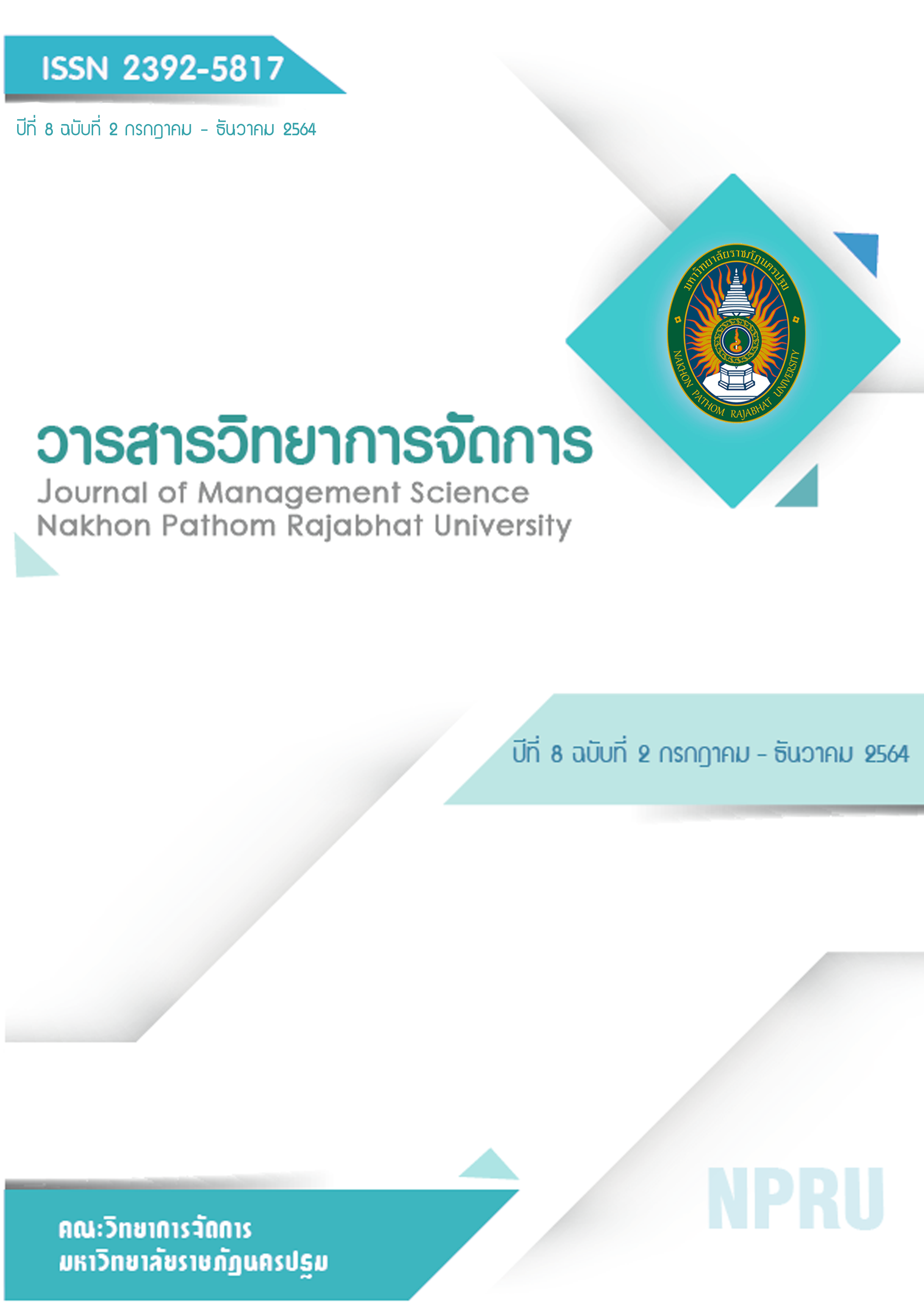Talent Management in Restaurant Business for Competitive Advantage
Main Article Content
Abstract
The restaurant business currently faces changing competitive environments, economics, politics, societies, and service workers. The important tools of these competitions are human resource management and talent management. Likewise, efficient and effective personnel management plays a crucial role in the competition of the sustainable restaurant business. Therefore, the purposes of this research were to study the definitions and traits of talented people, talent management, and the guidelines for developing talented people in the restaurant business. This study could be beneficial for the restaurant business in order to apply talent management and gain sustainable competitive advantages in business
Article history : Received 27 October 2020
Revised 21 January 2021
Accepted 28 January 2021
SIMILARITY INDEX = 2.82 %
Article Details

This work is licensed under a Creative Commons Attribution-NonCommercial-NoDerivatives 4.0 International License.
The views and opinions of the article appearing in this journal are those of the author. It is not considered a view and responsibility of the editorial staff.
References
กรมพัฒนาธุรกิจการค้า.(2562). ธุรกิจอาหารบทวิเคราะห์ธุรกิจประจำเดือนกุมภาพันธ์. [ออนไลน์].
สืบค้นเมื่อ 27 เมษายน 2563, จาก https://www.dbd.go.th/download/document_file/Statisic/2562/T26/T26_201902.pdf
ขวัญสิรี เพิ่มกว่าเก่า. (2559). ความพึงพอใจในการบริหารจัดการคนเก่งในธนาคารกรณีศึกษาธนาคารพาณิชย์แห่งหนี่งในประเทศไทย. วิทยานิพนธ์ปริญญามหาบัณฑิต, มหาวิทยาลัยธรรมศาสตร์.
คะนึงนิจ อนุโรจน์. (2554). Approach to Talent Management. Royal Thai Air Force Medical Gazette.
ชญารัศมิ์ ทรัพยรัตน์ และ วิชิต อู่อ้น. (2560). ความสัมพันธ์เชิงโครงสร้างของการบริหารจัดการคนเก่งที่ส่งผลต่อผลการดำเนินงานขององค์การ. RMUTT Global Business and Economics Review, 12 (1), 113-130.
ชุติมา วงศ์พระลับ.(2553). ความคิดสร้างสรรค์สร้างได้.Journal of Education Khon Kaen University, 33 (4), 10-21
พงษ์เทพ ดำจ่าง (2556). การบริหารจัดการคนเก่ง (Talent Management) : กรณีศึกษา ธนาคารกรุงไทย จำกัด (มหาชน). รัฐศาสตรมหาบัณฑิต, มหาวิทยาลัยธรรมศาสตร์.
พฤกษ์ สุวรรณาลัย, พิทักษ์ ศิริวงศ์ (2559) การจัดการคนเก่งในองค์กรธุรกิจกิจเอกชนข้ามชาติในประเทศไทย.วารสารจันทรเกษมสาร, 22 (42) ,1-12
ภัทรานิษฐ์ ศุภกิจโกศล.(2559). การจัดการทรัพยากรมนุษย์ในธุรกิจอาหาร SMEs ย่านเยาวราช.วารสารมนุษยศาสตร์และสังคมศาสตร์มหาวิทยาลัยราชพฤกษ์, 1 (3),101-115
ภาณุพันธ์ โอฬารกิจไพบูลย์.(2558). การพัฒนาตัวแบบการจัดการคนเก่งเชิงรุกของวิศวกรในอุตสาหกรรมผลิตฮาร์ดดิสก์.ดุษฏีนิพนธ์ปริญญาการจัดการดุษฏีบัณฑิต สาขาวิชาการจัดการ มหาวิทยาลัยศิลปากร.
มัลลิกา วิชชุกรอิงครัต. (2553). การศึกษาการทำงานเป็นทีมของพนักงานครูเทศบาลสังกัดเทศบาลเมืองชลบุรี. วิทยานิพนธ์ครุศาสตร์มหาบัณฑิต มหาวิทยาลัยบูรพา.
นพรัตน์ บุญเพียรผล.(2560). แนวทางการพัฒนาคุณภาพบริการของธุรกิจร้านอาหารสาหรับนักท่องเที่ยวนานาชาติในเขตอำเภอหัวหิน จังหวัดประจวบคีรีขันธ์. Veridian E-Journal, Silpakorn University,10 (1), 61-76
วีระวัฒน์ ปันนิตามัย. (2553). บทบาท สมรรถนะ และความเป็นมืออาชีพของนักทรัพยากรมนุษย์ไทย : วิกฤตเงียบท่ามกลางความดื้อรั้นในธรรมเนียมปฏิบัติ. วารสารพัฒนบริหารศาสตร์, 50(3), 43-74.
เศรษฐวัฒน์ เอกคณานุวงศ์. (2553). การจัดการทรัพยากรมนุษย์ที่มีความสามารถพิเศษ. วิทยานิพนธ์ปรัชญาดุษฎีบัณฑิต สาขาวิชารัฐประศาสนศาสตร์ มหาวิทยาลัยรามคำแหง.
สุกัญญา รัศมีธรรมโชติ. (2554). พัฒนาดาวเด่นเพื่อองค์กรที่เป็นเลิศ Talent Management by
Competency-Based Career Development and Succession Planning.กรุงเทพมหานคร: บริษัทพริ้นท์ซิตี้ จำกัด.
สุดารัตน์ โยธาภิบาล. (2557). สิงคโปร์กับสงครามการแย่งชิงคนเก่งทั่วโลกสู่ "ศูนย์กลางคนเก่งสิงคโปร์" บทเรียนและความท้าทายสู่แนวทางสร้าง "ศูนย์กลางคนเก่งภาครัฐไทย" ในบริบทอาเซียน. มนุษยศาสตร์ สังคมศาสตร์, 31, 1-28.
อรุณวดี นันทวัฒนานุกูล พรรัตน์ แสดงหาญ อภิญญา อิงอาจ. (2560). โมเดลการบริหารจัดการคนเก่งคนดีของสถานประกอบการอุตสาหกรรมไฟฟ้าและอิเล็กทรอนิกส์. Retrieved September 2, 2017, from: http://www.bbs. buu.ac.th/uploadedFiles/ articles/1460347748.pdf.
อรุณรุ่ง เอื้ออารีสุขสกุลและธีระวัฒน์ จันทึก.(2558) การบริหารจัดการคนเก่งเชิงกลยุทธ์: ปัจจัยสำคัญสู่ความได้เปรียบทางการแข่งขันอย่างยั่งยืน .Veridian E-Journal, Silpakorn University, 8 (3), 1096-1112
โปรแกรมร้านอาหารFR SME. (2560). โปรแกรมร้านอาหารFR SME. [ออนไลน์]. สืบค้นเมื่อ 1 มีนาคม 2563).จาก http://www.fr-asia.com/frsme/
Barney, J. B., Ketchen, D. J., Jr., & Wright, M. (2011). The future of resource-based
theory: Revitalization or decline?. Journal of Management, 37(5), 1299-1315.
Chodorek, M., & Sudolska, A. (2016). The significance of organizational citizenship behaviors for talent management - the example of polish companies. Journal of Economic and Social Development, 3(1), 76-86.
Kaye, T., & Andy, P. (2007). The Essential Guide to Managing Talent. Britain: Kogan Page Publishers.
Kolter, P. (2010). Marketing management (The Millennium ed.). New Jersey: Prentice Hall.
Kotler, P., & Armstrong, G. (2008). Marketing: An introduction. Englewood Cliffs, New Jersey: Prentice – Hall
Lunn, T.R. (1992). The Talent Factor. London: Kogan Page.
Mike W.& Dave F (1989). Organization Development through Teambuilding: Planning a Cost-Effective Strategy. New York: Wiley.
Ng Siew Kiang. (2008). The global talent war: why Singapore get to need serious
about branding itself. Ethos, 5.
Parasuraman, A., Zeithaml, V.A., and Berry, L.L. (1990). "SERVQUAL: A Multiple-Item Scale for Measuring Consumer Perceptions of Service Quality." Journal of Retailing 64(1) 12-40.
Parker, G. M. (1990). Team Players and Team Work: The New Competitive Business Strategy. San Francisco, Calif.: Jossey – Bass.
Rani, A. & Joshi, U. (2012). A Study of Talent Management as a Strategic Tool for the
Organization in Selected Indian IT Companies. European Journal of Business and
Management, 4(4), 20-28.
Robert, E.L., & Robert, J.H. (2006). Talent Management: A critical review. Human Resource Management Review, 16. 139–154.
Robertson, A., & Abby, G. (2003). Managing Talented People. Britain: Pearson Education Limited.
Sears, D. (2003). Successful talent strategies: Achieving superior business result through market-focused staffing. New York: American Management Association.
Walter, G. T., Stephen, A. S., & Jonathan P. D., (2010). Exploring talent management in India: The neglected role of intrinsic rewards. Journal of World Business, 45, 109-121.


